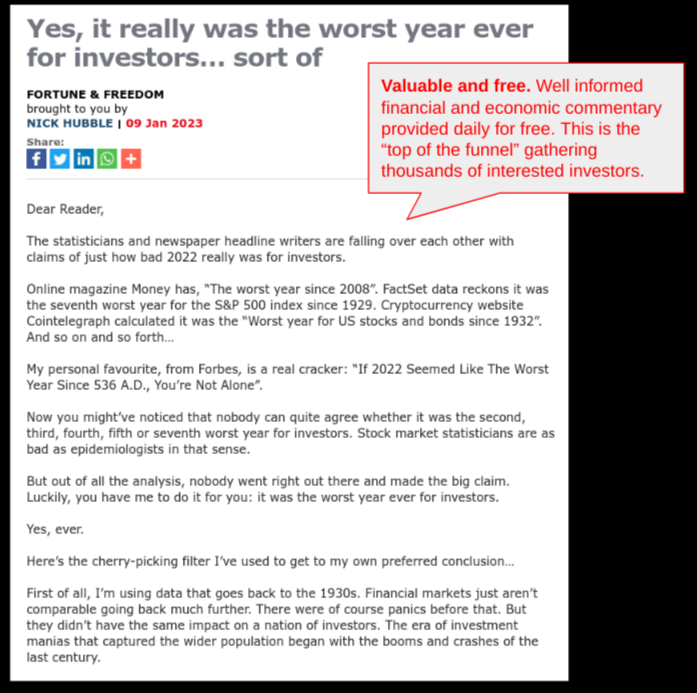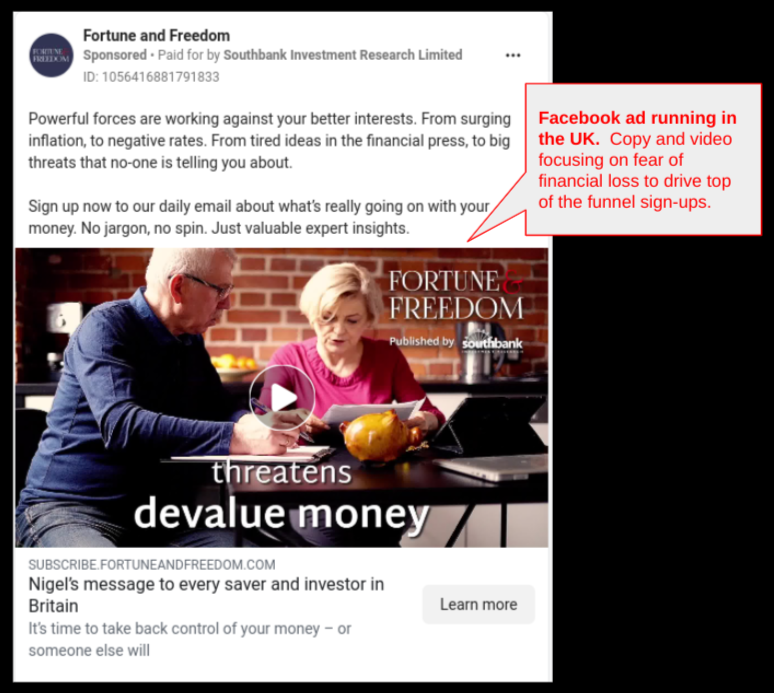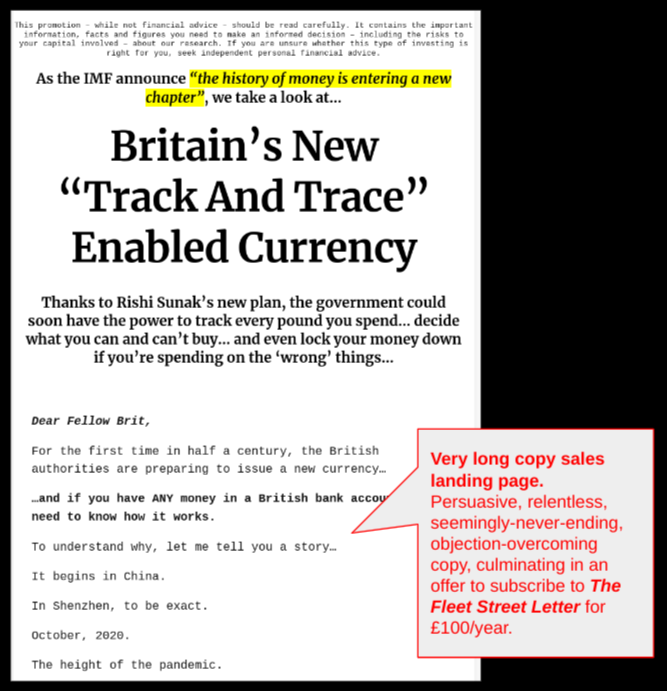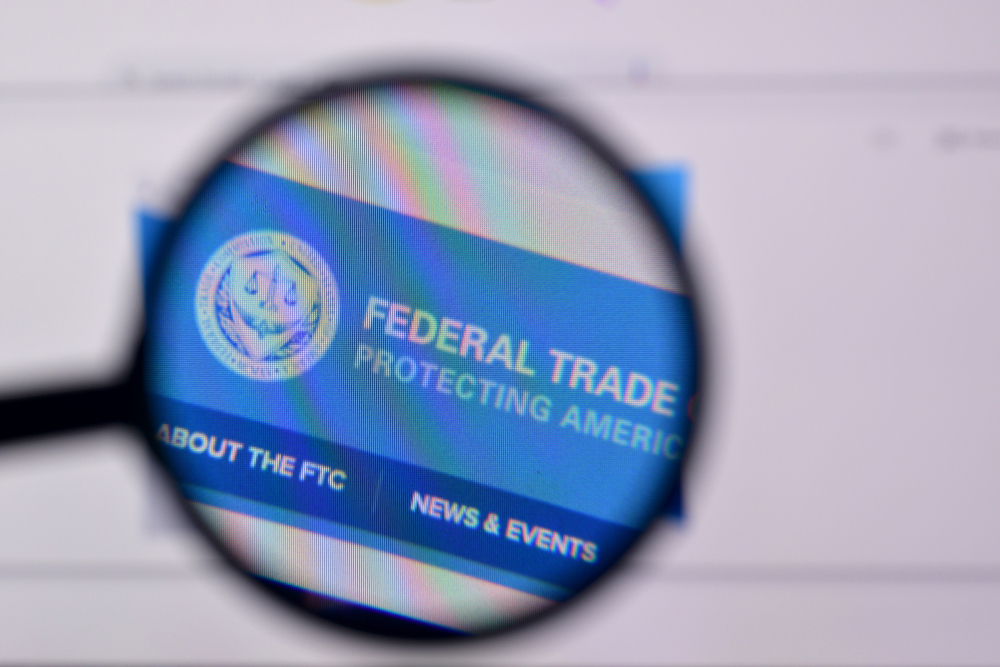CN#13. Fortune & Freedom: Freemium on steroids in a controversial $1 billion empire
Fortune & Freedom is one of more than 100 newsletters under the loose umbrella of The Agora, a newsletter giant offering advice on wealth or health to millions of free and paying subscribers.

NEWSLETTER DATA
TITLE: Fortune & Freedom
FREQUENCY: Daily
TYPE: Engagement and sales
TARGET AUDIENCE: Consumer, private investors
PURPOSE: “Intelligent insights, in plain English, about the threats to your money and how to avoid them."
SUBSCRIBERS: Tens of thousands (not verified)
WORD COUNT: 1,622
SENT FROM: editor@mb.fortuneandfreedom.com
SUBJECT LINE: The worst year ever for investors - sort of
DESIGN: Plain text, images only in adverts

Free and valuable editorial
If you want free financial market and investment commentary and analysis, Fortune & Freedom is not a bad place to get it. In this issue there's a well-argued for and against debate on the statement that 2022 was “the worst year ever” for investors.
As a subscriber you'll get similar in-depth ruminations every day, ranging from considerations on dealing with the effects of inflation to concerns about the emergence of digital currencies.
Until recently the newsletter was fronted by Nigel Farage, the man who helped engineer Britain’s exit from Europe. Although he's now lower profile and most of the copy is written by staffers, he represents a right-wing, libertarian approach to markets and investing.
From an editorial point of view it's not exceptional, compared to, say The Economist or the Wall Street Journal, but then it's not trying to compete in their markets.
Fortune & Freedom is trying to sell something, and follows the marketing truism that ultimately, every purchase decision is made on the basis of one of two basic human instincts: fear or greed.
Fortune & Freedom majors on fear. Currently it's tapping into recession, fear of falling markets, mistrust of politicians and the state, and the wealth eroding effect of inflation.
So the commentary is gloom-laden, but there's always a solution at hand, in the form of a paid-for newsletter subscription.
When economies recover and growth kicks in again the main themes will trend back to making money, for which there will also be another, alternative, more positive product.
With curiosity-piquing and fear-inducing headlines like "The gods of interest rates are in for their second humiliation", "Is this the miracle America has been waiting for?", and "It’s not your money any more" this is an emotion triggering exercise.
Fortune & Freedom could be any one of over 100 similar newsletters published by The Agora or its affiliate companies.
It's an example of the most efficient and profitable operation of a freemium content newsletter business model.
Business model: A direct response copywriting system on steroids
I don’t know Fortune & Freedom’s revenue but the same relatively simple system it follows has been used to generate $1 billion in total sales for its loose parent company, The Agora, mainly in financial and health newsletters.
At the top of the funnel is a high value freemium email newsletter, usually daily, that's well-informed, entertaining, up to the minute and habit-forming.
One of the first was The Daily Reckoning (financial) in 1979, written by Agora founder Bill Bonner and which achieved 400,000 subscribers at one point, followed by Early to Rise (health and wellness).
(I keep trying to sign up for The Daily Reckoning for old times sake but I never receive anything, so I'm assuming it's defunct.)
The model has spawned other freemium brands operating as the funnel/capture for email addresses, creating a warm list that the publishers can then sell to.
These are operated under subsidiaries, joint ventures or other flexible arrangements, all working independently but under The Agora umbrella in one way or another.
The model is:
- High value free newsletter - properly researched and professionally produced content, usually sent daily, building trust.
2. Native advertising for recurring income subscription products, almost always "in-house" products.
3. Link to highly persuasive, objection-defeating direct response, very long copy sales pages or video sales pages. Some call these "high pressure".
4. Purchase of recurring subscription product.
5. Upsells of more expensive products, or (in the event of no sale) downsell of cheaper product.
As a subscriber you could find yourself being wooed in no uncertain terms to start a financial relationship with Daily Profit Alert, Crash Speculator, Frontier Tech Investor, or Trigger Point Trader.
There always seems to be something new, although having said that, in this issue it's The Fleet Street Letter (founded 1938) that's being promoted.
Bill Bonner recently said that the companies under The Agora employ about 2,000 people and “definitely” have turnover of more than $1bn.
Each publication or group of publications has a publisher, working independently but with back office support provided by the group.
Marketing: direct response copy marketing machine
The free newsletter is the top of funnel capture mechanism for a sophisticated direct response copy driven marketing machine.
There's no interest in web page eyeballs or views in this publishing business, as capturing the email address is all that matters.

The newsletter is promoted with paid digital advertising, including banner placements in the New York Times newsletter and on Facebook (above).
Native advertising to a warm, receptive audience
The newsletters are the vehicle for relentless native advertising for the in-house subscription newsletters. These feature both in Fortune & Freedom or as stand-alone "solus" email sends with an urgent message.

The link in this edition goes to a 7,643-word sales page for the £100/year Fleet Street Letter monthly investment newsletter.
Recently, Fortune & Freedom was promoting UK Independent Wealth and Frontier Tech Investor, with £79/year price tags.
Controversy and marketing promotion mistakes
It's a great model, so it's something of a shame about the compliance mistakes that have made The Agora such a controversial entity.
The Agora and its affiliates' success has not be achieved without some legal penalties imposed by regulatory authorities in the US and UK for mistaken claims made for its products or unauthorised advice given.
In 2011, the Federal Trade Commission (FTC) in the US charged Agora with making false and misleading claims in its advertising materials, specifically regarding the performance of its investment products. The company was ordered to pay $1.5m in fines and was banned from making similar false claims in the future.
In 2015 the Financial Conduct Authority (FCA) in the UK issued a warning to investors regarding Agora's investment products, stating that they were not authorized to sell or market these products in the UK.
In 2021 Agora Financial, LLC, and several of its affiliates agreed to pay more than $2m to settle FTC charges that they tricked seniors into buying pamphlets, newsletters, and other publications that falsely promised a cure for type 2 diabetes or promoted a phony plan to help them cash in on a government-affiliated check program.
In addition to the monetary judgment, which will be used to provide refunds to defrauded consumers, the proposed settlement also bars Agora and the other defendants from making such false or unsupported claims.
It is, of course possible to promote financial and health products without breaking the law, primarily by removing guarantees that products will produce a positive outcome and making it clear that outcomes are uncertain. This occasionally seems to get missed by the group's compliance officers.
Comment
I've been fascinated by the inner workings of The Agora since I began working in newsletters in the 1990s.
Given their success, I'm continually surprised that the system is not embraced by more publishers, although The Agora and its affiliates do operate somewhat under the radar and their system is not widely known.
Some people don't like their products, or the way they are sold, and The Agora seems to find it hard to rein in the copywriters that go too far with their persuasive claims.
So the approach is not for everyone, but for every sceptic that these are all “get rich quick” scams there's an astute investor making use of the insight and information provided and building a valuable investment portfolio.
Love them or hate them, the methods used by Fortune & Freedom and its sister titles have helped to build a money-making powerhouse, for which regulatory fines are chicken feed, almost just a cost of business.
I attended a publishing conference in the 1990s where Bill Bonner explained how for a while he thought the internet would destroy his business, based then as it was on paper newsletters and hard copy direct mail.
In fact, he said, the reverse happened. The internet supercharged it, like taking an already effective system and injecting it with steroids (my analogy).
The certainty that persuasive long copy sales used for decades by direct response copywriters will convert a proportion of an interested list has been magnified by the reach and low costs offered by the internet.
It's just a pity that The Agora can't resist pushing it too far on occasion.
Further reading:
Craig Ballantyne gives an insider's view:

An excellent in-depth analysis of The Agora by Pete Boyle:

Sensible advice on how to promote financial offers without falling foul of the regulators:

To read more about direct response copywriting and see it in action, read the case study on Ben Settle, here.
Sign up for Fortune & Freedom here.
Thanks for reading Champion Newsletters. If you like the newsletter, please help me reach a wider audience by sharing with friends and colleagues. You can guarantee receiving every issue by becoming a paid subscriber.


